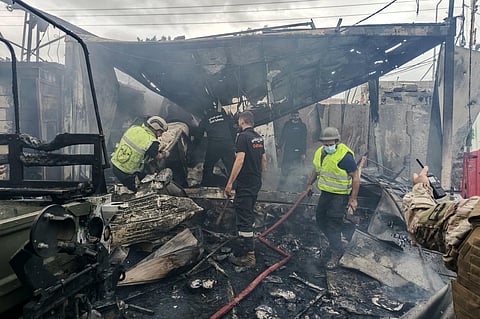
- NEWS
- the EDIT
- COMMENTARY
- BUSINESS
- LIFE
- SHOW
- ACTION
- GLOBAL GOALS
- SNAPS
- DYARYO TIRADA
- MORE

Israel struck Hezbollah’s south Beirut stronghold on Sunday as Lebanese state media reported intense fighting in the border area and Israel’s military said around 250 projectiles were fired at its territory.
The heavy exchanges of fire came despite an immediate Israel-Hezbollah ceasefire call from top EU diplomat Josep Borrell while on a visit to Lebanon Sunday.
The Israeli military said Iran-backed Hezbollah fired around 250 projectiles into Israel during the day, one of the war’s highest daily figures.
On 24 September, there were 350 launches from Lebanon, according to the military.
That was the day after Israel escalated air strikes against Hezbollah, helping to transform nearly a year of limited clashes, which were initiated by the Lebanese group in solidarity with its Palestinian ally Hamas, into a full-blown war.
Some rockets fired on Sunday were intercepted by Israeli air defenses, but others caused damage to houses in central Israel, according to AFP images.
In Lebanon, a day after a wave of Israeli strikes that the health ministry said killed 84 people, Israel again struck the capital’s southern suburbs, a Hezbollah stronghold.
Deadly strikes also hit the heart of Beirut over the past week, and on Sunday Lebanon said in-person classes in the capital area would be suspended Monday for safety reasons.
The conflict has killed at least 3,754 people in Lebanon since October 2023, according to the health ministry, most of them since September.
On the Israeli side, authorities say at least 82 soldiers and 47 civilians have been killed.
Earlier this week, US special envoy Amos Hochstein said in Lebanon that a truce deal was “within our grasp,” and then headed to Israel for talks with officials there.
In the Lebanese capital, Borrell held talks with parliamentary speaker Nabih Berri, who has led mediation efforts on behalf of his ally Hezbollah.
“We see only one possible way ahead: an immediate ceasefire and the full implementation of United Nations Security Council Resolution 1701,” Borrell said.
“Lebanon is on the brink of collapse,” he warned.
Under Resolution 1701, which ended the last Hezbollah-Israel war of 2006, Lebanese troops and UN peacekeepers should be the only armed forces present in the southern border area.
The resolution also called for Israel to withdraw troops from Lebanon, and reiterated earlier calls for “disarmament of all armed groups in Lebanon.”
On Sunday, Hezbollah said it launched attacks using missiles and drones directed at the Ashdod naval base in southern Israel, one its deepest targets so far, as well as military sites in the central Tel Aviv area.
The Israeli military did not comment on the specific claims, but it said earlier that air raid sirens had sounded in several areas, including in the Tel Aviv suburbs.
Medical agencies reported that at least 11 people were wounded in Israel.
The Palestine Red Crescent said 13 people were injured in the occupied West Bank by a falling interceptor missile.
AFP images from Petah Tikva, near Tel Aviv, showed several damaged and burned-out cars, and a house pockmarked by shrapnel. In nearby Rinatya, several houses were damaged.
